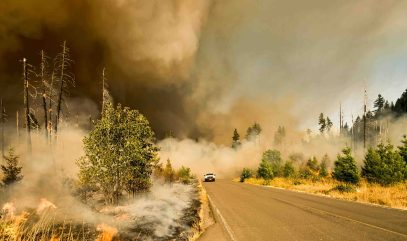Vote NO on 2117
Initiative 2117, which effectively repeals Washington State’s Climate Commitment Act (CCA), will negatively impact our local business community through a reduction in planned financial investments in transportation and wildfire prevention, impacts to our local workforce, and eliminating a tool that will help mitigate financial risks already being experienced by businesses.
Spokane cannot afford 2117:
- I-2117 will repeal the funding source that provides $5 billion in investment for Move Ahead Washington, the state’s 16-year transportation package, which is already strained by increased costs of construction. If I-2117 passes, the Chairs of the Transportation Committees in the House and Senate have warned that the entire package will need to be reworked - putting projects at risk for delay or cancellation. This includes the North Spokane Corridor freeway and other transportation infrastructure projects around the state to move freight and reduce congestion.
- The State’s transportation budget is already experiencing challenges due to limited funding sources and increased costs. Passing I-2117 will likely increase the need for an additional gas tax to fund this essential infrastructure. “Before I-2117 we were facing a $5 billion to $6 billion challenge to finish projects, maintain our roads and fulfill our obligation to remove salmon-blocking culverts. If passed, I-2117 doubles that problem. I-2117 exacerbates an already critical funding gap for our state’s transportation future.”
- Climate change poses significant financial risks to businesses and families including health risks from heat & wildfire. Climate is threatening supply chains and continued investment in fossil fuels puts our economy at risk while the global economy is shifting toward renewable energy.
- In Eastern Washington, Climate change is intensifying the wildfire season creating longer burning and more damaging fires that are threatening our homes and businesses. It is estimated to cost more than $5B to repair and rebuild after last years’ Gray and Oregon Road fires consumed over 350 structures including 240 homes.
- CCA provides funding that eases the burden on Washington residents as we transition to clean energy.
- Impacts from climate change are increasing insurance premiums and in some cases insurance companies are leaving entire markets deemed high risk from wildfires:
- Insurance companies are refusing to insure property in states, including Washington, with high wildfire risk.
- The Harvard Business School notes that “As the risk of extreme weather events increases, premiums for flood and storm protection will likely rise to mitigate insurance companies’ risk. This could result in higher insurance costs for many firms and negatively impact their bottom lines”.
- “Nearly 3 in 10 organizations are noticing the operational impacts of climate-related disasters, such as facilities damage and workforce disruption”
- “Business could experience losses of approximately $0.45 for every $1 of cumulative operating cash”
- “The data is particularly striking when examining companies in the utilities sector, which includes industries such as electricity, water, and gas. This sector has the highest percentage of assets at high risk from climate-related events compared to other sectors. Notably, 50% of the assessed companies' high-risk assets were located in the United States”
I-2117 would slash funding for preventing wildfires.
- I-2117 would cut nearly $30 million for programs across the state that help make our communities less vulnerable to catastrophic wildfires while making our forests healthier - and help local governments, private landowners, and communities prevent and prepare for fire in high-risk areas.
- This includes: funding for several statewide programs that reduce severe wildfire risk by removing dead and downed brush and vegetation on the forest floor through controlled burning and thinning out overgrown forests; grants through the Firewise USA program, which encourages local communities and landowners to prepare for wildfire and implement resilience measures in high-risk areas; and funding to build out the workforce we need to maintain and restore healthy forests and manage extreme wildfires.
Spokane County could lose significant financial investments and jobs:
- During the first funding cycle, the CCA generated $120M for projects located in Spokane County. The largest investment categories are public transit ($64M) and buildings, innovation, and clean energy ($25M) including a $5M investment at Kaiser Aluminum.
- An additional $440M in long-term funding could be available to Spokane County from programs the legislature has already identified. Spokane County can anticipate subsequent investments each biennium into and beyond 2024 if we say No to 2117.
- Much of this funding is deemed at high-risk if the CCA is repealed, including $78M of the $120M from the first funding cycle and most of the $440M long-term funding.
- Investments include money for agriculture, schools, hard-to-decarbonize industries like Kaiser Aluminum, green jobs and green manufacturing, fire prevention, clean air, and clean water.
- Carbon Quest and the City of Spokane are at risk of losing $650,000 for a carbon capture project at the Waste to Energy plant.
- Statewide, the risks of repealing the CCA means all Washingtonians risk losing funding for clean air, clean water, safer transportation, wildfire mitigation, sustainable agriculture, and workforce development.
- 675,000 Washington low to moderate income households will receive a $200 credit on their electricity bill paid for by the CCA.
There may be significant long-term impacts to our local workforce: Gen Z and Millennials may migrate to other parts of the US if they believe Washington State isn’t acting on climate change
- According to Pew Research Center, two-thirds of Americans want government to take more action on climate change, including restrictions on carbon emissions and developing carbon capture
- Climate change is a significant concern for Gen Z and Millennials according to a 2024 Deloitte survey:
- “Roughly six in 10 Gen Zs and millennials [say] they have felt worried or anxious about climate change”
- They believe “governments should play a bigger role in pushing business to address climate change”
- Nearly half of Millennials and Gen Z have changed or plan to change jobs due to climate concerns
Over 350 organizations (here and here) oppose Initiative 2117 including:
- Amazon
- REI
- Microsoft
- Seattle Metropolitan Chamber of Commerce
- Clean Tech Alliance
- American Council of Engineering Companies
- American Institute of Architects WA Council (AIAWA)
- American Planning Association Washington Chapter
- Affiliated Tribes of Northwest Indians
- Audubon Washington
- Bonneville Environmental Foundation
- CarbonQuest*
- Certified Electrical Workers of Washington
- Craft3*
- IAM 751 (International Association of Machinists and Aerospace Workers – Boeing Chapter)
- League of Women Voters of WA
- Measure Meant*
- NW Energy Coalition
- Resource Synergy*
- SEIU 775 & 925 (Service Employees International Union – healthcare, public sector, property services)
- Sheet Metal Workers Locals 66 & 55 (Spokane)
- The Lands Council
- The Nature Conservancy
- UA Local 598 – Plumbers & Steamfitters, Eastern WA
- UFCW 3000 (grocery, retail, healthcare) – Spokane
- Veterans For Peace, Spokane Chapter #35
- Washington Education Association
- Washington Machinists Council
- Washington Physicians for Social Responsibility
- Washington State Building and Constructions Trade Council
- Washington State Council of Firefighters
- Washington State Labor Council
- Washington State Medical Association
- Washington State Nurses Association
- And many others
*Denotes GSI members
Read More
Vote NO on 2066 to Retain Energy Efficiency Standards
Initiative 2066 is needless and is a solution in search of a problem that doesn’t exist. This initiative actually repeals important planning measures that will keep energy costs lower. While this initiative seeks to ensu
Reject the business case for sustainability: The 1980s wants its business case back
They say a rising tide raises all boats. But there isn’t any raising to be done when the tide no longer comes into the bay – all boats remain stranded. We are often asked about the business case for sustainability. For y
Protect Your Community or Organization with a Climate Action Plan
Introduction Our changing climate impacts every aspect of our lives—our economy, our communities, and the environment—in ways both visible and unseen. While scientists and environmental organizations have long recognized
Witnessing the world of sustainable business firsthand
As a young student with a passion for climate justice and sustainability, it always felt like a contradiction to pursue a degree in business. From what I had witnessed, businesses didn’t necessarily operate ethically. Mu




